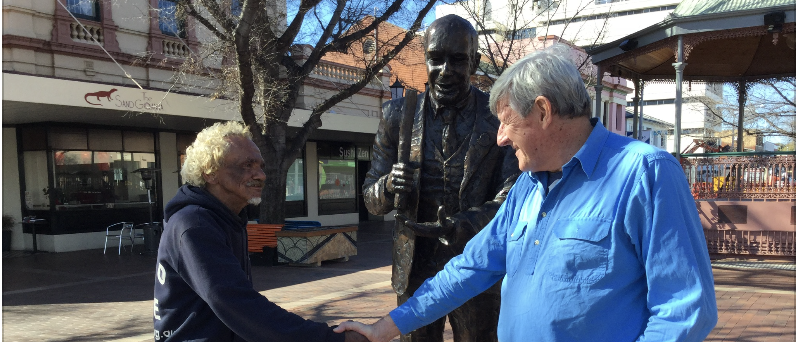|
‘We need to share our stories, accept our stories, and write a new story together.’ - Billy Williams. In recent years, the story of Bill Ferguson has been highlighted in the main street of Dubbo. While Martin Luther King and his 'I have a dream' speech is well known, Bill Ferguson and William Cooper and others who played similar roles on behalf of the Aboriginal people, are not. Paul and Riverbank Frank take as many opportunities as they can to tell the Bill Ferguson story in schools and groups of young people. Paul wrote this short story after speaking with Bill Ferguson's daughter Isabel. 'A curtain of steady late-winter rain swathes the evening sky. Dwarfed by the leaden expanse of cloud, three figures plod steadily along the sodden roadway, picking their way through the puddles. The man is a tall, erect figure, his muscular shoulders filling out his dark suit coat, water streams from the Fedora hat pulled firmly down over his eyes. The stripling boy struggles manfully with the battered suitcase, now and then swapping it from hand to hand, while his sister strides alongside her father, head held high, hair bedraggled, clutching a parcel of food wrapped in grease-proof paper. ( Read the rest by clicking on Read More.) ,
CROSSING THE GREAT DIVIDE - The Story of Bill Ferguson (Paul Roe) A curtain of steady late-winter rain swathes the evening sky. Dwarfed by the leaden expanse of cloud, three figures plod steadily along the sodden roadway picking their way through the puddles. The man is a tall, erect figure, his muscular shoulders filling out his dark suit coat, water streams from the Fedora hat pulled firmly down over his eyes. The stripling boy struggles manfully with the battered suitcase, now and then swapping it from hand to hand, while his sister strides alongside her father, head held high, hair bedraggled, clutching a parcel of food wrapped in grease-proof paper. When they reach the highway the boy sets his burden down with a grunt and says stoutly, “There you go Dad.” A rough shearer’s hand rests on the boy’s thin shoulder. “Thanks Fred, you’re a champion. Keep practicing your running while I’m away son, and whatever you do, don’t let them beat you!” The youngster nods vigorously, looking up at his father’s face. “And make sure you water my veggie garden and fruit trees when it dries up. I’ll be away for a while. And Bella …” looking into the girl’s bright, dark eyes, “... help mum with the other kids won't you?” His eyes switch from one to the other, “Try not to wear her out. And no nicking off from school!” The youngsters nod in unison, wide-eyed. The girl thrusts the small parcel of food forward. “How long before you get a lift Dad?” Bella’s hand grips his sopping coat sleeve. He glances down. Were they tears in her eyes or just raindrops? “Hard to say girl,” her father says gruffly. “Sometimes it's an hour, sometimes more. Not much traffic from Dubbo to the city at this time of day.” He grins to cheer her up. “But with my colour skin I’m more likely to get a lift on a dark night! Now, get home before you drown!” He squints through the rain to watch as the two spindly-legged kids bolt into the gathering gloom in a race for their home in Wingewarra Street. Sitting down slowly on his case he turns his collar up to keep the water from running down his neck. The crumpled newspaper in his hand is headlined by Hitler and the threat of war in Europe. War. Why always war? Why can’t people just get on? He sighs deeply, slowly shaking his head. Human beings always seem to find something to divide over. He looks down at his knotted fingers and his mind drifts back to a sweltering day in the Riverina, swaying in the saddle beside his father - stocky, thickset Bill Ferguson, a boundary rider and shearer with a reputation for being handy with his fists. Nobody messed with Old Bill in those days … definitely not to his face! “Hey Dad! You know those boys from the Warangesda Mission that were shearing with us back there at Tubbo Station?” His father shifted in his saddle to fix shrewd blue eyes on his son. He had already guessed that feisty young Bill had been brooding on something. “Aye lad.” The brogue of ‘the Old Country’ as he called it, hadn’t left him. “Well how come they only got paid half what you and I did? They worked just as hard as us! And they were better with the shears than some of those other blokes!” There was anger in his voice. The older man had narrowed his eyes to stare into the shimmer of the heat haze. He had known this would bubble to the surface one day. He leaned over and placed his muscular forearm beside his son’s. “Just that laddie, their skin’s a different colour, same as yours and your mother’s. To some folks way of thinking that makes them worth only half as much.” There was a rough compassion in the softly spoken words. The boy looked hard at the red, sun-blotched skin beside the smooth brown of his own, then up into his father’s sober face. A frown bent the boy’s thick eyebrows, accenting his words. He spat them out. “Yeah, well what happened to the fair go for the working man that the Union blokes are spruiking in the sheds? Doesn’t that work for us black fellers?” ‘Us’- such a tiny word on his lips, but a massive shift across a frontier in his heart. He knew deep down that these were his people - the dark people of Australia. He twists in his seat on the suitcase, feeling the fire that had started a slow burn in his gut that day. It’s still burning even after forty years. It has driven him to cover long miles to rough shearing sheds, lonely timber mills, miserable mission compounds and the pitiful ‘Abo camps’ around Condoblin, Bourke, Brewarrina, Walgett, Coonabarabran and out in the Pilliga Scrub. It smouldered in his eyes as he watched young men belittled and treated as station lackeys, young girls torn away from family and made servants in station homesteads. It flared into hot words on his lips as he stood with feet planted on a soapbox in the Sydney Domain facing a wall of indifferent white faces. A tightly folded newspaper slapping his palm, emphasised his words. “We do not ask for charity, we do not ask you to study us as scientific freaks. Above all, we do not ask for your ‘protection’. No thanks! We have had 150 years of that! We only ask for justice, decency and fair play. Is that too much to ask?” Justice! It ate at him day and night. His hands ball into tight fists. Now it is taking him to the cedar panelled halls of Parliament House in Macquarie St. He’ll paint some vivid pictures of the life of his people on those polished walls that will make those smug politicians squirm! White Australia! He’d show them what life was like for the Old Australians neglected on the fringe of country towns. A battered Dodge, headlights doused by the rain, squelches to a halt beside him and the door swings open. A weathered, young-old farmer’s face leans forward, peering into the dark. “Where to mate?” “Sydney.” “Not likely! I can get you as far as Wellington though.” “Thanks, that's a start.” The gears crunch and the car skids briefly before getting traction in the gravel. Glancing across, the man starts suddenly and his eyes turn hostile as he stares more closely at his passenger. “Hey, aren’t you that bloody nigger Unionist ... Jesus Christ!” “Well, I’m a Union man, but my name’s actually Bill Ferguson and I know you Mr McPherson.” The driver ignores the dark man’s outstretched hand. Ferguson presses on with a grim smile; “But I reckon if Jesus was here he’d probably hang around with unionists …. and the dark people! He was a working man you know ... like you and me.” Ferguson says this firmly, looking the farmer in the eye. The driver gives a short, dry laugh. “Yeah right, and do you reckon he’d go ‘round stirring up the workers, makin’ trouble for farmers who are busting their backs tryin’ to make an honest living in the sticks back of bloody Coonamble?” The Aboriginal man deflects the derision. “We’re only asking for a fair go Mr Mc Pherson ... same as he would. And I’m not against you. My dad was a Scot who worked on properties and did it tough. I know how it is. My mother was half–caste Wiradjuri, raised on Toganmain Station. We learned how hard that life can be.” “Huh. Do tell.” The farmer grips the wheel, knuckles white, staring straight ahead into the downpour. “I ought to chuck you out and make you walk to Sydney…” Ferguson shrugs and turns away. “Well, It wouldn’t be the first time.” A grim silence fills the car. A chasm lies between the two bushmen. One black, one white. Both know the sweltering heat of the sheds, the lather of sweat, the stink of sheep, the bone-weariness of hard toil. Both know the grind of debt, the daily struggle to make ends meet. One is a citizen of the Commonwealth of Australia, the other is not. They tunnel on through the night, together, but separate. Worlds apart. Somewhere near Wongarbon the white man gropes for safe ground. “You ever play footy? Yer big enough.” “No. Boxing was my game. My father taught me to use my fists. ‘Chin music’ he called it!” A chuckle slips across the chasm. “Came in handy working round the sheds I can tell you. Never lost a fight in twenty years!” A nod and a low, grudging grunt from the driver. “Ever fight in the ring?” “No. Never bothered. Too smart”. Then with a grin, “I still get into plenty of fights now though - different sort. And I’ve lost a few rounds, mostly through having to fight with one hand behind my back … and trouble with some of the refs!” With that wry remark, the silence resumes, softening slightly. A mile past Guerie the dark man speaks into the void, eyes fixed on the road ahead. “My Dad once told me the yarn of how the Highland clans were driven off their land by wealthy landowners. ‘The Clearances’ I think he called it ... back a hundred years ago in Scotland. Told them they weren’t to speak their Gaelic language either. He said the same thing’s happened to us Aboriginals. Kicked off our own country. Told to shut up.” A note of defiance creeps into his voice as it rises. “Hasn’t shut me up though! My old man was a hard-headed old Presbyterian and he taught me from the Bible that we are all God’s children and that we had to stick up for what’s right the same way Moses stood up for his people when they were slaves!” The driver’s eyes slowly shift sideways. There is a flicker of surprise at the back of his gaze. “That’s my clan you’re talking about. Some of the McPhersons were crofters ... you know, little farmers, driven off their ancestral land. Ended up living in the slums of Glasgow. My great-grandfather Angus eventually got a passage on a sailing ship to Melbourne. Went to the goldfields to make his fortune.” He snorts and his lips tighten. “We never saw any of it. The only metal my old man inherited was some Turkish shrapnel in the leg at Gallipoli. After the War he drew a soldier-settler block ... worse luck! The Depression and a couple of droughts have just about finished us...You bloody Union blokes and yer strikes will see me walk off before too long.” McPherson gives a hoarse laugh. “Maybe we’ll both be on the wallaby!” There is little mirth in it. “Mightn’t do us any harm’ Ferguson counters. “I camped out here with the road gang that helped build this road during the Depression years. We dug a lot of ditches and shovelled a lot of gravel I can tell you. We were all on the dole with hungry families to feed back in Dubbo. We just had to get on. We learned empty bellies don’t have a colour.” Both men smile knowingly, but to themselves. After a pause, “Your Dad fought at Gallipoli, right?” “Yeah, Light Horseman. Even won a medal ... for what it was worth!” Ferguson picks up the note of cynicism. “I knew three Aboriginal brothers who got pretty badly knocked about fighting for King and Country. One bloke died, one lost an arm. The King gave the other a top medal for brave conduct … But being Anzacs didn’t make them Australian citizens when they got home. It’s alright if you go overseas and die for the country if you’re black, but you’re not allowed to live for it back here!” The driver swerves violently, swearing as an old man kangaroo leaps into the beam of the headlights. The men are briefly thrown together, shoulder to shoulder, but quickly recover their distance. There’s bitterness in Ferguson’s voice as he adds, “And the government didn’t give them any land to live on...just mission compounds at the bottom end of town. That’s all they got fighting for Country!” The silence that returns is sober, but slightly more companionable. The lights of a Wellington cafe glimmer on the wet street. The farmer swings the car to the curb. Ferguson slowly offers his hand again. “Thanks for the lift.” A small hesitation, then a tentative grip. McPherson fumbles in his coat pocket. “I reckon you could use a couple of bob for a feed.” It’s an awkward, matey gesture from a country bloke not comfortable with charity. The two men lock eyes. “Thanks Mr McPherson, but I'd rather not if you don’t mind.” Patting the parcel under his arm, “I’ve got some tucker with me, so I’ll be right. I’m going down to Sydney representing the Aboriginal Progressive Association, to tell the Government we don’t want to be on the end of a handout. We don’t want a Board of white fellers to protect us either. The best protection is to be recognised as people...like you are, with the same rights here in our own country. It’s a matter of getting a fair go, that’s how I see it. Simple as that.” Ferguson’s eyes narrow as he juts out his chin. “We won’t give up until we’ve got it you know.” McPherson holds his gaze and nods slowly. “Alright, if that’s how you want it.” “That’s how all my people want it, to be straight with you. It’s not about me.” McPherson shakes his head, looking away. “Nah, I can’t see it happening ... not in my lifetime anyway.” He selects first gear with a decisive crunch. The dark man climbs out, hefts his suitcase from the back seat, half turns, and then over his shoulder, “Oh, I can see it happening alright”. It's a voice full of conviction. “We all need hope Mr McPherson, you and me both. We’ve got to keep dreaming ... and working together if we’re going to be the ‘civilised, kindly, humane’ nation I read about in the newspapers. They say charity starts at home, eh?” He dips his head, touching the brim of his hat. “Thanks again for the lift.” The rain thickens and thrums on the roof of the car. The farmer shouts above the din, “Reckon you’ll cross the Great Divide tonight?” A pause and a quizzically raised eyebrow in the shadow under the hat. “Maybe tonight...more likely tomorrow. Might get a lift on a truck headed for the Sydney markets.” “See you out Coonamble way some time.” The dark man thrusts the door shut and steps away. His hunched figure is quickly swallowed by the night. A long road lies in front of him.
0 Comments
Leave a Reply. |
AuthorJoin The Outback Historian, Paul Roe, on an unforgettable journey into Australia's Past as he follows the footprints of the Master Storyteller and uncovers unknown treasures of the nation. Archives
October 2023
Categories
All
|
|
Sponsored by
|
Privacy Policy
|
|
Copyright 2020 by The Outback Historian
|
Site powered by ABRACADABRA Learning
|


 RSS Feed
RSS Feed

